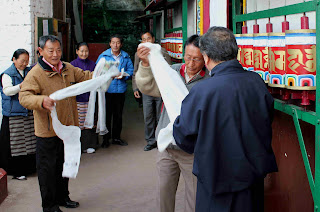The organizers had set up the meetings with the settlement at 9:30 am in the morning of the 22nd. During the meeting, we were told that most of the attendees would be women and it was actually very true as about 2/3rd of the Tibetans who turned up for the meetings were women.
(TNT la at MIAO Choephelling)
(TNT la visiting the primary school)
One thing about Miao that impressed me a lot was the fact that it had a lot of youngsters returning to their settlements either to teach or to work in the co-operative society (Nyamle). Not only that, the youngsters have started an adult education program so that the elders can at least read their prayers. It was really impressive to see the amount of dedication the youth have towards the community.
After the meeting with the local Tibetans, TNT la was able to visit the Nyamle and see what they were doing such as the local carpet industry and the other initiatives.
Another initiative which we saw in Miao was the Siddartha Home which is like a boarding hostel for the local children so that they are able to adjust easier when they will leave for different schools after 8th grade. It primarily aims to teach the students about life in a boarding school and the individual efforts needed to achieve success.
(TNT la at the local CST school)
(A CST students asking TNT a question)
TNT la also had an opportunity to speak with the students from the local CST school which had grades up to the 8th standard and it was very surprising to see the students ask a couple of perceptive questions even though they were pretty young.
We left Miao around 2pm as we had to reach Dibrugarh around 8:30 for our train to Dimakpur.
(TNT la at MIAO Choephelling)
(TNT la visiting the primary school)
One thing about Miao that impressed me a lot was the fact that it had a lot of youngsters returning to their settlements either to teach or to work in the co-operative society (Nyamle). Not only that, the youngsters have started an adult education program so that the elders can at least read their prayers. It was really impressive to see the amount of dedication the youth have towards the community.
After the meeting with the local Tibetans, TNT la was able to visit the Nyamle and see what they were doing such as the local carpet industry and the other initiatives.
Another initiative which we saw in Miao was the Siddartha Home which is like a boarding hostel for the local children so that they are able to adjust easier when they will leave for different schools after 8th grade. It primarily aims to teach the students about life in a boarding school and the individual efforts needed to achieve success.
(TNT la at the local CST school)
(A CST students asking TNT a question)
TNT la also had an opportunity to speak with the students from the local CST school which had grades up to the 8th standard and it was very surprising to see the students ask a couple of perceptive questions even though they were pretty young.
We left Miao around 2pm as we had to reach Dibrugarh around 8:30 for our train to Dimakpur.































